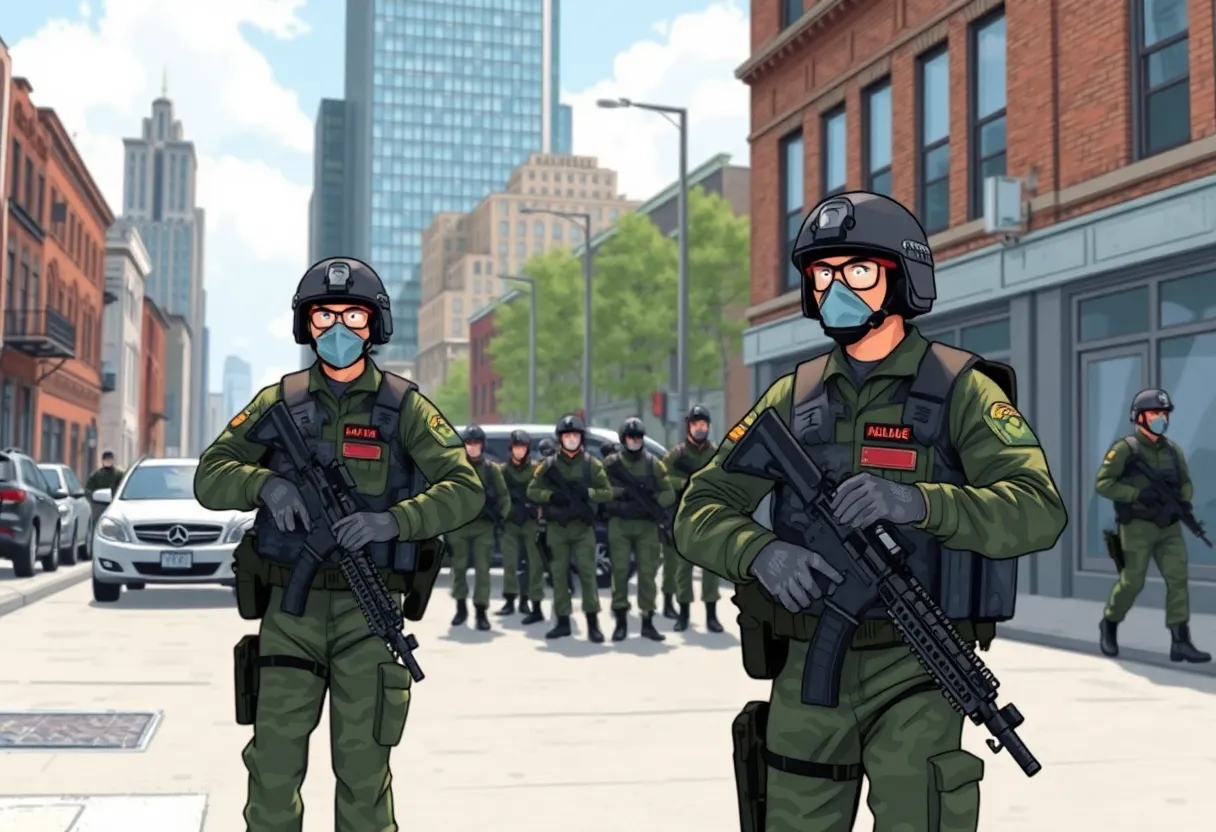Chicago, New York, Baltimore, August 26, 2025
News Summary
The federal government is contemplating deploying National Guard troops to major U.S. cities like Chicago, New York, and Baltimore as part of a strategy to combat crime and illegal immigration. This plan has encountered swift opposition from local leaders and legal challenges. With nearly 2,000 National Guard members currently in Washington, D.C., state officials in various cities are preparing to contest these federal actions, citing falling crime statistics and potential violations of state authority. The situation raises pressing questions about the legal and operational complexities of using military forces for local law enforcement.
Washington, D.C.
Summary — Federal threat to deploy National Guard to major cities
The federal administration is considering sending National Guard troops to several major U.S. cities, including Chicago, New York, Baltimore and others, as part of a proposed crackdown on crime and illegal immigration. The plan has prompted immediate pushback from city and state leaders, legal challenges in at least one state, and calls from some officials to restrict or clarify how and when the Guard can be used for law enforcement tasks.
Key developments
– The administration has indicated an intention to deploy Guard forces to cities it identifies as failing to control crime and illegal immigration. No deployment timeline has been provided.
– Nearly 2,000 National Guard members are currently stationed in Washington, D.C., and officials say additional mobilizations to other cities are under consideration.
– State and local leaders in targeted cities have vowed to contest federal deployments legally and to oppose what they describe as inappropriate military involvement in local policing.
– California has filed a lawsuit over a previous deployment of National Guard troops to Los Angeles that occurred in June without the state governor’s approval.
– Governors and mayors in cities named for possible action have publicly rejected the need for federal troops; some cite falling crime statistics and express concern that military presence would not improve public safety.
Responses from state officials
– The governor of Massachusetts, who serves as commander-in-chief of the state National Guard, reported not being part of discussions to send her state’s guard members to other cities and described the federal threats as political theater that does not enhance safety. She also criticized past federal budget actions that reduced funding for local law enforcement programs, community policing, victims’ services and the Guard by about 40 percent.
– The governor of Illinois and the mayor of Chicago have both said their city does not need a military occupation and intend to block any attempted federal deployments. Illinois officials note that crime rates in the state’s largest city have been trending downward.
– Other governors and municipal leaders in named cities have signaled readiness to use legal and political means to resist deployments they consider inappropriate.
Legal and command issues
– The National Guard normally operates under state authority but can be federalized by the president under specific statutory conditions. This dual-status structure can create legal and practical conflicts if governors and the president disagree over orders to use Guard forces for local law enforcement.
– In California, the state has already filed suit related to a prior deployment that occurred without gubernatorial approval, signaling one legal avenue states may use.
– Retired military leaders have warned that employing Guard troops for routine law enforcement in cities could produce command conflicts and complicated legal disputes when state executives object to federal direction.
Proposed state-level changes
– In Massachusetts, legislation has been proposed to change the chain of command within the state Guard. The bill would create a cabinet-level position placing the Guard superintendent in direct reporting relationship to the governor rather than to a different state official, and would seek legislative limits on how the Guard can be used following recent controversies.
– Supporters of such legislation argue the change would enhance state control and provide clearer civilian oversight of the Guard during politically charged incidents.
Context and political considerations
– The federal proposals focus on major, often Democratic-led cities with diverse populations. Critics contend deploying military forces for local crime control raises constitutional, legal and public-safety questions and risks politicizing the National Guard. Proponents in the federal administration frame the option as a response to perceived spikes in crime and illegal immigration in targeted localities.
Immediate outlook
– No detailed timeline has been provided for further deployments. State and local leaders in the named cities are preparing to challenge any attempts they view as federal overreach. Legal disputes and political pushback are likely to determine whether and how any future federal use of the National Guard for domestic city deployments proceeds.
Frequently Asked Questions
What cities are named for potential National Guard deployment?
Officials have mentioned Chicago, New York, Baltimore and other major U.S. cities as possible destinations. Los Angeles was the subject of a previous June deployment that prompted legal action.
Has a timeline been set for deployment?
No timeline has been provided. Federal leaders have indicated intent but have not announced specific dates for troop movements to the cities discussed.
Who controls the National Guard?
The National Guard normally operates under state authority and is controlled by each state’s governor. The president can federalize Guard units for certain national missions, creating a dual-status arrangement that can lead to disputes when state and federal priorities diverge.
Can governors prevent federal deployment of Guard troops to their states?
Governors can contest federal actions in court and refuse state-activated support. If the president federalizes Guard units under federal authority, the federal government may have greater control, but legal challenges and political resistance from governors have been and will likely be used to push back.
Are there current legal challenges?
Yes. California has sued over a previous deployment of National Guard troops to Los Angeles that occurred without the governor’s approval. Officials in other states have indicated they will pursue legal avenues if similar deployments are ordered.
What changes are being proposed at the state level?
In Massachusetts, a bill sponsored by a state senator would reassign the National Guard superintendent to report directly to the governor in a new cabinet-level role and seek limits on how the Guard may be used in domestic situations.
Quick reference table
| City / State | Named for Possible Deployment | Local Stance | Legal/Policy Notes |
|---|---|---|---|
| Chicago, Illinois | Yes | Mayor and governor oppose military occupation and plan to block deployments | Officials cite falling crime rates and will pursue legal challenges |
| New York, New York | Yes | State and city leaders have signaled likely opposition | No federal timeline announced |
| Baltimore, Maryland | Yes | Local officials expected to contest federal intervention | Potential legal disputes if deployment ordered |
| Los Angeles, California | Previously deployed (June) | State sued over deployment made without governor’s approval | Ongoing legal action demonstrates one challenge pathway |
| Washington, D.C. | Currently hosts nearly 2,000 Guard members | Federal presence already significant; further moves under consideration | Shows scale of current domestic Guard use |
| Massachusetts (state-level) | Not a deployment target; legislative response | Governor not consulted on sending local Guard elsewhere; criticized federal actions | Proposed bill to change Guard chain of command and limit uses |
Deeper Dive: News & Info About This Topic
HERE Resources
Boston Mayor Maintains Sanctuary Policies Amid Federal Pressure
Boston Officials Defend Sanctuary Policies Amid Federal Pressure
Ongoing Homelessness and Drug Use Crisis in Boston’s Mass and Cass
Protest in Boston Demands Release of Immigrant Rights Leader
Additional Resources
- NBC Boston
- Wikipedia: National Guard
- Boston.com
- Google Search: National Guard deployment trump
- WCVB
- Encyclopedia Britannica: National Guard
- WHDH
- Google Scholar: National Guard in US cities
- Boston Herald
- Google News: Trump deploying National Guard

Author: STAFF HERE BOSTON WRITER
The BOSTON STAFF WRITER represents the experienced team at HEREBoston.com, your go-to source for actionable local news and information in Boston, Suffolk County, and beyond. Specializing in "news you can use," we cover essential topics like product reviews for personal and business needs, local business directories, politics, real estate trends, neighborhood insights, and state news affecting the area—with deep expertise drawn from years of dedicated reporting and strong community input, including local press releases and business updates. We deliver top reporting on high-value events such as Boston Marathon, Head of the Charles Regatta, and Boston Harborfest. Our coverage extends to key organizations like the Greater Boston Chamber of Commerce and Associated Industries of Massachusetts, plus leading businesses in finance, biotech, and insurance that power the local economy such as Fidelity Investments, Biogen, and Liberty Mutual Insurance. As part of the broader HERE network, we provide comprehensive, credible insights into Massachusetts's dynamic landscape.





